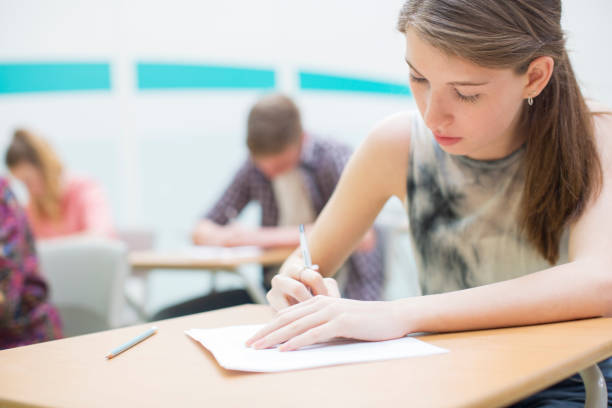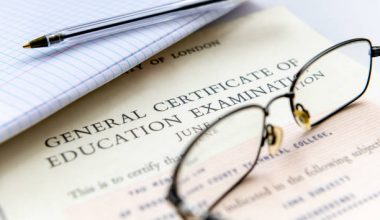Are you gearing up for your GCSE exams, and wondering how many hours of revision a day for GCSE? You could schedule 30- to 45-minute study periods with brief breaks in between, and try to limit your daily study time to no more than four hours.
Instead of trying to cram several subjects for hours on end and possibly adding to your stress, you’ll be able to revise more productively in shorter spurts..
To structure your study routine effectively? Achieving success in your GCSEs requires proper planning and dedication. One crucial aspect of your study plan is determining how many hours a day you should revise.
In this comprehensive guide, we’ll walk you through the ideal revision schedule, providing expert insights, practical tips, and answers to frequently asked questions.
Table of Contents
- How Can I Find My Ideal Study Routine?
- How Many Hours a Day Should You Revise For GCSEs?
- How far in Advance Should I Start Revising for my GCSEs?
- Is it better to study alone or with others?
- Can I use Technology for my Revision?
- How Many Hours of Revision a day for Uni
- How Much Revision Should a Year 11 Do
- Developing a GCSE Revision Schedule
- When Should I Begin My GCSE Revision?
- How Many Hours a day Should I Spend Revising for my GCSEs?
- Frequently Asked Questions
- Conclusion
- References
- Recommendations
How Can I Find My Ideal Study Routine?
Preparing for GCSE exams is a significant milestone in your academic journey. To excel in these critical tests, it’s essential to strike a balance between effective revision and maintaining a healthy lifestyle.
Here are some of the ways to prepare for your GSCE;
Setting Realistic Goals
Before diving into the specifics of how many hours to study, it’s crucial to set realistic goals.
Understand the subjects you’re studying, their difficulty levels, and your personal strengths and weaknesses.
Setting achievable targets will help you plan your revision hours effectively.
Quality Over Quantity
It’s not just about the number of hours you spend studying; the quality of your revision matters.
Aim for focused, productive sessions rather than marathon cramming.
Short, concentrated study periods are often more effective than long, unfocused ones.
The 2-Hour Rule
Many experts suggest breaking your study time into two-hour blocks.
Research indicates that the brain’s ability to concentrate starts declining after about two hours.
Take short breaks between these blocks to recharge your focus.
Adapting to Your Learning Style
Everyone has a unique learning style. Some students absorb information quickly, while others require more time.
Tailor your study schedule to your learning style, whether it’s visual, auditory, or kinesthetic.
Read Also: Can You Retake a GCSE If You Have Already Passed?
How Many Hours a Day Should You Revise For GCSEs?
Now, let’s get to the heart of the matter: the number of hours you should dedicate to GCSE revision each day.
Core Subjects vs. Electives
The number of hours you should dedicate to each subject can vary.
Core subjects like Math, English, and Science may require more study time, while electives might need less. Allocate your study hours accordingly.
Gradual Increase
As the exam dates approach, consider gradually increasing your daily study hours. Starting with a baseline and gradually ramping up your study time can prevent burnout.
Consistency Is Key
Consistency is more important than cramming. Aim for a daily routine that you can sustain.
Even if it’s just an hour or two, studying every day will yield better results than sporadic, intensive sessions.
Listen to Your Body
Pay attention to your body’s signals. If you’re feeling exhausted or unfocused, it’s okay to take a break. Overworking yourself can lead to diminished returns.
Read Also: How Many Hours of Revision A Day For A Levels
How far in Advance Should I Start Revising for my GCSEs?
The ideal time to start revising will vary from person to person, but a general rule of thumb is to begin around 3-4 months before the exams.
This gives you enough time to cover all the necessary topics without feeling overwhelmed or rushed.
However, it’s important to remember that everyone has different learning styles and preferences. Some people may need more time, while others might be able to grasp concepts quickly and require less revision.
It’s essential to gauge your own understanding of the subjects and adjust your revision timeline accordingly.
The key is to find a balance between starting early enough to cover everything thoroughly and not burning yourself out by starting too early.
Remember to create a study schedule, break down your subjects into manageable chunks, and take regular breaks to keep yourself motivated and focused.
Read Also: How To Revise For Maths GCSE: The Ultimate Guide
Is it better to study alone or with others?
When it comes to studying, whether it is better to study alone or with others depends on your personal learning style and preferences.
Some people thrive in a solitary environment, finding it easier to concentrate and focus without any distractions. If you are someone who prefers quiet and solitude while studying, then studying alone might be the best option for you.
On the other hand, studying with others can also have its benefits. Group study sessions can provide opportunities for discussion and collaboration, allowing you to gain different perspectives and insights on the subject matter.
Additionally, explaining concepts to others can enhance your understanding of the material as well. If you enjoy bouncing ideas off of others or find it helpful to have someone hold you accountable, then studying with others might be more beneficial for you.
It’s important to experiment and find what works best for you. You may even find that a combination of both solo and group study sessions works well for different subjects or topics.
Remember, the key is finding a study environment that allows you to stay focused, motivated, and engaged in your learning journey.
Read Also: 15 Ways To Motivate Yourself To Revise For GCSEs And A-Levels
Can I use Technology for my Revision?
Yes! Using technology for revision can be a great way to enhance your studying experience. There are numerous tools and resources available that can make the process more efficient and enjoyable.
One option is to use online platforms or apps that offer interactive quizzes and practice questions. These can help you test your knowledge, identify areas where you need improvement, and track your progress over time.
Additionally, there are various websites and video tutorials that provide explanations and examples to help you understand difficult concepts.
Another useful strategy is to utilize digital note-taking tools. Apps like Evernote or OneNote allow you to organize your notes in a structured manner, making it easier to review and revise later on.
You can also take advantage of online collaboration tools to study with classmates or create virtual study groups.
Incorporating technology into your revision routine can be a valuable asset, but remember to find what works best for you. Experiment with different tools and techniques until you discover the ones that help you learn most effectively.
How Many Hours of Revision a day for Uni
Students review for exams for 15 to 20 hours a week, according to The Student Room. That may seem like a lot, but when you break it down, it’s not.
The recommended amount of time is probably something you’ve calculated for yourself, but it comes out to three to five hours a day, with a weekend off!
How Much Revision Should a Year 11 Do
A Year 11 student should try to revise for at least an hour or two a day, and as exams get closer, they should seek to revise more.
The precise quantity of revision is dependent on the unique learning style and strengths of each student, but it’s critical to strike a balance between productive revision and enough sleep.
Developing a GCSE Revision Schedule
Here is how to schedule on how many hours of revision you can do a day for GCSE:
What
For guidance on what to learn and review, consult your subject lecturers. They typically possess a solid understanding of the subjects that are more and less common on exam papers. Prioritizing your learning is understandable, even though you should strive to comprehend the entire course.
When
The majority of people will gain by having a dedicated editing session. Most of us are compelled to utilize the evening for studying and revision because of the way a “normal day” is structured, but this may not work for everyone.
It can be worthwhile to make an extra effort to take advantage of this time of day because some people perform best in the early hours of the morning.
Setting aside time on a regular basis to study pays off, despite the fact that it could initially seem a little tedious. Rest assured, when you develop the habit, it does become simpler.
Where
Having a “personal study space” where they are not distracted by outside sounds every few minutes can be beneficial for most people.
While it’s not always possible, you might be able to get your parents or another relative to assist you find a study space that is reasonably peaceful. You might be able to use the after-school homework provided by the school.
Who
Forming a small study group with a few pals could be beneficial for you; but, you must take care that it doesn’t turn into a “party” or “gossip-shop.” Collaborating with others can be quite advantageous if you possess sufficient discipline. You can support one another through challenges.
You can divide up the tasks. You two can (in a nice but competitive way) “test” one another. Teaching others is one of the best ways to learn, therefore this is a tremendously helpful strategy.
Also See: When Should You Start Revising For Your GCSEs?
How
Keeping in mind that the typical educated adult can focus for approximately thirty minutes at most, it is advisable to divide your study time into manageable chunks.
You have the option of switching up your activities or taking a quick five-minute break at the conclusion of each session. To keep your interest level high, it’s a good idea to switch between two or even three subjects.
When Should I Begin My GCSE Revision?
While there’s never a perfect time to start GCSE revision, the earlier you can get started, the easier it will be to finish.
The little-frequent approach will, in general, guarantee that you have dedicated enough time to your review, however you will undoubtedly have more time to study during school long holidays and revision holidays. Remember to assess your progress with practice questions and previous exams.
How Many Hours a day Should I Spend Revising for my GCSEs?
The amount of time you set aside each day to revise for your GCSEs will mostly rely on your individual schedule. Generally speaking, you should revise for four to six hours each day during the holidays, but keep in mind that your schedule should be flexible.
It is also useful to know that you can use the assignments you have from school toward your revision. Remember that the quality of your revision matters just as much as the amount, so plan in regular pauses.
Frequently Asked Questions
Yes, studying excessively without breaks can lead to burnout and decreased retention. Balance is key.
The best time to study varies from person to person. Some prefer mornings, while others are night owls. Find your peak hours.
Weekends can be valuable study days, but don’t forget to relax and recharge too.
Absolutely! If you’re struggling with a topic, seek help from teachers, tutors, or classmates.
Set achievable goals, reward yourself for milestones, and remind yourself of your long-term objectives.
Yes, short breaks are essential for maintaining focus and productivity.
Conclusion
Finding the right balance for GCSE revision is essential for success.
There is no one-size-fits-all answer to the question, “How many hours a day should you revise for GCSEs?” It depends on your goals, subjects, and personal preferences.
Remember, quality study time, consistency, and self-care are the keys to excelling in your exams.
References
- thinkstudent.co.uk _____ How Does Grading on a Curve Work?
- senecalearning.com ______ Learn 2x faster for free with Seneca
- keystonetutors.com _____ GCSE Revision Techniques and Skills






